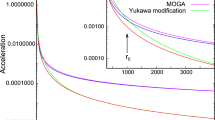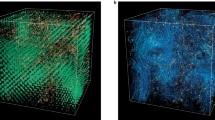Abstract
Using N-body simulations, we study the effects of the mass spectrum in the evolution of self-gravitating systems of softened point-mass particles. The mass function is described by a power law and the ratio between the maximum and minimum mass is \({\text{10}}^{\text{4}} \). We showed that the dynamical evolution of the system depends on the mass spectrum: the secular evolution time is longer for flatter mass spectrum. For the steepest mass spectrum, the secular evolution time is of the order of the relaxation time. The mass segregation effects are achieved rapidly and the core-halo structures are formed. The projected number distributions for the systems with mass spectrum change drastically with the evolution while the projected mass distributions are not affected. Velocity dispersion profiles are modified in the sense of heating of the central regions of the systems, while the velocity anisotropy profiles are slightly affected. The consequence of our results on the dynamical evolution of clusters of galaxies is presented.
Similar content being viewed by others
References
Antonov, V.A.: 1992, Vestn. Leningrad Gros. Univ. 7, 135.
Binney, J.: 1982, Mon. Not. R. Astron. Soc. 200, 951.
Biviano, A., Durret, F., Gerbal, D., Le Fèvre, O., Lobo, C., Mazure, A. and Slezak, E.: 1995, Astron. Astrophys. 297, 610.
Capelato, H.V., Gerbal, D., Mathez, G., Mazure, A., Salvador-Solé, E. and Sol, H.: 1980, Astrophys. J. 241, 521.
Cavaliere, A., Santangelo, P., Tarquini, G. and Vittorio, N.: 1986, Astrophys. J. 305, 651.
Chernoff, D.F. and Weinberg, M.D.: 1980, Astrophys. J. 351, 121.
Cohn, H.: 1980, Astrophys. J. 242, 765.
Cohn, H.: 1985, in: J. Goodman and P. Hut (eds.), Dynamics of Star Cluster, p. 161.
Durret, F., Gerbal, D., Lachièze-Rey, M., Lima-Neto, G. and Sadat, R.: 1994, Astron. Astrophys. 287, 733.
Farouki, R.T. and Salpeter, E.E.: 1994, Astrophys. J. 427, 676.
Funato, Y., Makino, J. and Ebisuzaki, T.: 1992, Publ. Astron. Soc. Jpn. 44, 613.
Geller, M.J. and Beers, T.C.: 1982, Publ. Astron. Soc. Pacific 94, 421.
Giersz, M. and Heggie, D.C.: 1996, Mon. Not. R. Astron. Soc. 279, 1037.
Gunn, J.E. and Gott, J.R.: 1972, Astrophys. J. 176, 1.
Henon, M.: 1961, Ann. d'Ap. 24, 369.
Hernquist, L.: 1987, Astrophys. J. Suppl. 64, 715.
Hernquist, L.: 1990, Astrophys. J. 356, 359.
Hernquist, L. and Katz, N.: 1989, Astrophys. J. Suppl. 70, 419.
Inagaki, S.: 1985, in: J. Goodman and P. Hut (eds.), Dynamics of Star Cluster, p. 189.
Inagaki, S. and Saslaw, W.: 1985, Astrophys. J. 292, 339.
Lee, H.M. and Goodman, J.: 1995, Astrophys. J. 443, 109.
Lightman, A.P. and Shapiro, S.L.: 1978, Rev. Mod. Phys. 50, 437.
Londrillo, P., Messina, A. and Stiavelli, M.: 1991, Mon. Not. R. Astron. Soc. 250, 54.
Lynden-Bell, D.: 1967, Mon. Not. R. Astron. Soc. 136, 101.
Lynden-Bell, D. and Wood, R.: 1968, Mon. Not. R. Astron. Soc. 138, 495.
McMillan, S., Hut, P. and Makino, J.: 1991, Astrophys. J. 362, 522.
Murphy, B.W. and Cohn, H.: 1988, Mon. Not. R. Astron. Soc. 232, 835.
Murphy, B.W., Cohn, H. and Hut, P.: 1990, Mon. Not. R. Astron. Soc. 245, 335.
Nozakura, T.: 1992, Mon. Not. R. Astron. Soc. 257, 455.
Salmon, J.K. and Warren, M.S.: 1994, J. Comput. Phys. 111, 136.
Salvador-Solé, E., González-Casado, G. and Solanes, J.M.: 1993, Astrophys. J. 410, 1.
Serna, A. and Gerbal, D.: 1996, Astron. Astrophys. 309, 65.
Serna, A., Alimi, J.M. and Scholl, H.: 1994, Astrophys. J. 427, 574.
Schechter, P.: 1976, Astrophys. J. 203, 297.
Spitzer, L., Jr. and Hart, M.H.: 1971, Astrophys. J. 166, 483.
Spurzem, R. and Takahashi, K.: 1995, Mon. Not. R. Astron. Soc. 272, 772.
van Albada, T.S.: 1982, Mon. Not. R. Astron. Soc. 201, 939.
Young, P.: 1980, Astrophys. J. 242, 1232.
Author information
Authors and Affiliations
Rights and permissions
About this article
Cite this article
Chan, R. The Influence of a Mass Spectrum on the Long Term Evolution of a Self-Gravitating System of Softened Particles. Astrophysics and Space Science 250, 11–34 (1997). https://doi.org/10.1023/A:1000401504222
Issue Date:
DOI: https://doi.org/10.1023/A:1000401504222




